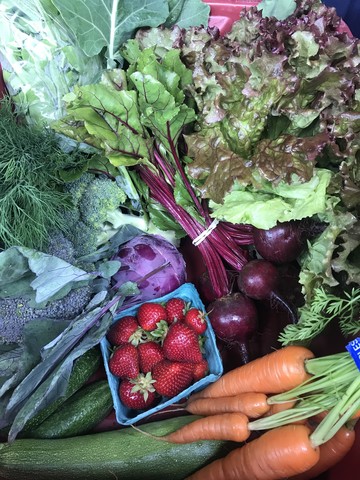In your Harvest Basket this week:
- Carrots
- Dill
- Lettuce
- Strawberries
- Kohlrabi
- Mini cukes
- Beets - some members will get sweet red beets, others will get Chioggia beets (pink skin with a pink and white bulls-eye interior)
On Rotation:
- Broccoli
- Broccolini
- Zucchini
- Arugula
- Mizuna - mizuna is a mild, light green, serrated Asian green - wonderful as a salad or alongside a slab of fish
A few quick notes about storing your produce and keeping it perky for as long as possible:
- Any leafy vegetable, like lettuce, herbs, bunch greens and baby greens, do best in the fridge in a sealed up plastic bag. They like it between 34 and 40 degrees with high humidity. Broccoli, broccolini and cauliflower are the same way. Best used in the first week.
- Root veggies like carrots and beets, and dense veggies like kohlrabi, store the longest if you take the tops off and store in a plastic bag in the fridge. They'll keep for months without tops, but won't taste as good 3 weeks from now as they do today.
- Zucchini and cukes prefer life at around 50 degrees with some humidity, but who has their fridge set to 50?! Nobody, I hope! They'll go soft on the counter, so your best bet is to put them in the fridge in a plastic bag but use them within the week before they get slimy.
- Strawberries will last on your counter for a day or two, and will continue ripening as they sit there. However, you can get a lot more life out of them if you keep them in a tupperware in your fridge. Not that anyone is actually making it home with a full pint of strawberries....If you are, you probably don't have kids in the backseat :)
Farm Updates
- NEW laminated checksheets are going out to all pickup locations this week! Please mark yourself off each week with the dry erase pen!
- BULK BASIL by SPECIAL ORDER! Primo tops, no stem, $18/pound. Pesto-lovers rejoice! To order, email Bets your:
- Name
- Pickup location
- How many pounds you want
- Daytime phone number
Farming Improv
I have one regret about college and it's that I didn't take an improv class. At the time I had my schedule packed with other classes: fiction writing workshops, sustainable development in Latin America, ecological forest management, biology, econ, statistics...
The thing I've heard over and over from friends who did enroll in improv is that it was the most valuable class they took. My friend the labor organizer, my friend the OSU farm advisor, they swear that improv has served them in life more than any other course. Darn, I guess I really blew it in undergrad.
But good news, my Stanford alumni magazine came in the mail last month and had a whole spread about the "8 Life Lessons You Can Learn from Improv: How to apply just-go-with-it wisdom to your career, realtionships and well-being." The funny thing is, some of the guiding principles of improv have been guiding the management of the farm without me realizing they had anything to do with improv. Even better news: I didn't have to pay an arm and a leg for the college credits!
- Pay Attention: Yup, keen observation is by far the most important skill for keeping a highly diversified farm like ours humming, and for averting occasional disaster. Everyday I'm paying attention to every detail, with eyes, ears and nose cocked to all the sensory information the farm is throwing at us - why is that row of cauliflower an imperceptibly lighter shade of green - is there fertility stress? Why is the pump cycling so often - do we have a leak somewhere in the mainline? How big are the newly budding broccoli crowns and what's the weather forecast and should we pick them today or will they hold until Friday?
- Don't Go it Alone: It's all about working together - one giant spontaneous choreography each day to get all the work done between dawn and dusk on the farm. We're all leaning on each other to pull off a successful season, and the energy of every single person on our crew is essential.
- Trust that the Scene Will Evolve: Things are in constant flux on the farm, so extremely seasonal is our model of production. It helps to remember that one setback - like symphylans in the spring Brassicas - will give way to some other success, like beautiful June carrots. We are never stuck in one failure for too long, the failures teach us how to be better farmers, and in the end the diversity of the farm carries us through.
- Stay Positive: It's easy to think it's the end of the world, but it never is. The glass-half-full mindset is the place where we proactively solve problems on the farm. The pressure tank exploded? OK, I guess that means it's time to replace it, build a better pumphouse, and plumb the system smarter than we did the first time.
- Accept the Offer: Saying "yes" to whatever is going on at the farm lubricates the wheels of creative innovation. COVID-19 means we can't run our farmstand? OK, Coronavirus, we'll turn it into a drive-thru!
- The Journey is the Thing: "what makes improvisers so good at creating something out of nothing isn't as much about what they do as it is about how they do it..." We farm because we love this place, we love working together as a family, we love to eat well, and we believe in organic, regenerative agriculture and it's ability to transform communities - from the living community in our gut microbiome all the way up to how humanity interacts with this planet. Yeah, it's about growing carrots, but it's also about a whole lot more.
My advice to you this week: say yes to beets! Accept the offer (even if you are sure you don't like beets), stay positive (they really might taste good!), don't go it alone (share them with friends), trust that the scene will evolve (i.e. you won't get beets next week!), and know that the journey is the thing (you tried them and confirmed for yourself that you really still do not like beets so you decided to carve them into stamps for your kids and you made really cool vegetable art).
A+!!!

